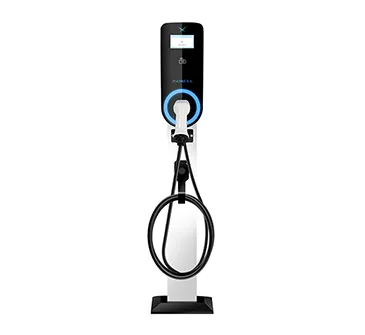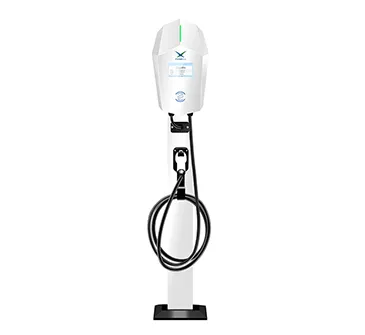Level 2 ev charger
The Level 2 EV Charger (AC Charging Station) is designed for residential, commercial, and public areas, offering stable and efficient charging solutions. Compared to Level 1 chargers, its charging speed is 3-6 times faster and is compatible with most electric vehicles. It is an ideal choice for home charging and small to medium-sized commercial scenarios.
- Input voltage: 1 phase/3 phase
- Max current:32A*1, 16A*3/32A*3
- Out put power range: from 3.5KW to 22KW max
- Features type: RFID Card/QR code by App
- Network type: 4G Card/WiFI/Ethernet
- Connector types: G/BT, SAE J1772/ IEC 62196
- Input voltage: 1 phase/3 phase
- Max current:32A*1, 16A*3/32A*3
- Out put power range: from 3.5KW to 22KW max
- Network type: 4G Card/WiFI/Ethernet
- User interface: 4.3 inches LED Screen
- Connector types: G/BT, SAE J1772/ IEC 62196
FAQ
A Level 2 EV charger uses a 240V power source (often referred to as AC charging or destination charging) and provides significantly faster charging than a Level 1 charger, which operates at 120V. On average, a Level 2 charger can add 25–30 miles of range per hour, compared to only 4 miles per hour with Level 1. While Level 3 (DC fast charging) can charge up to 80% in under 30 minutes, it's typically designed for public or commercial use, not for residential installation.
Most EVs sold in North America and other regions support the SAE J1772 standard, making them compatible with Level 2 chargers. However, Tesla vehicles require an adapter to use standard Level 2 EVSEs. Always refer to your vehicle’s specifications to confirm connector compatibility before purchasing or installing a charger.
A Level 2 charger typically requires a dedicated 240V circuit. It’s recommended to install it on a separate breaker to prevent overloads and ensure safety. Depending on your home’s electrical panel capacity, you may need an upgrade. A licensed electrician should assess your system to confirm whether your panel can support the charger’s amperage. Permits may also be required depending on local regulations.
Charging time depends on the battery capacity of the EV, the vehicle's onboard charger capabilities, and the charger's output. On average, Level 2 chargers deliver 25–30 miles of range per hour. For most EVs, a full charge can take between 4 to 10 hours, making it ideal for overnight charging or regular daily use.
Level 2 charging is gentler on the battery than DC fast charging and generally has no significant negative effect on battery lifespan. Modern EVs are equipped with Battery Management Systems (BMS) that regulate temperature and optimize charging behavior. For optimal battery health, many manufacturers recommend keeping the state of charge between 20% and 80% for daily use and only charging to 100% when necessary for long trips.


